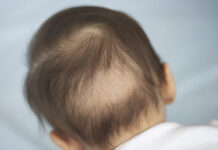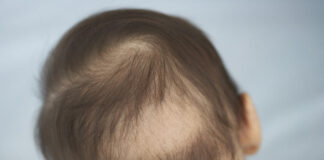Should you be worried about newborn sneezing?
Upon noticing every hiccup, gurgle, or sneeze, parents become extremely anxious about their newborn’s health and consider rushing to a doctor. Is there a problem with the baby? Is sneezing a warning of a cold on the way? Is it necessary for parents to be concerned?
Absolutely not!
If sneezing occurs without any other symptom of an illness, then it is completely normal. You might be shocked to learn that sneezing in babies is a positive indication, suggesting that the baby’s small system is functioning well. It is, in fact, a normal reflex, similar to the startle reflex.
This reflex is also apparent in adults, but parents are usually frightened by the fact their baby sneezes more than normal. It’s still fine, believe me. For a variety of reasons, the criteria of what is normal for a baby may differ from those of an adult.
For the time being, let’s look at why babies sneeze a lot.
What causes newborn sneezing?
To calm our fellow parents down, we have compiled a list of possible reasons why your newborn has seemingly sensitive nostrils.
Small nostrils
As previously said, your child’s nostrils are small, which means dust and other foreign materials can readily obstruct their routes. What do you think they’ll do? Get a tissue and blow their noses? Obviously not, and this is where nature jumps in to help them in the form of a sneezing reflex. And this is precisely the primary reason that causes excessive newborn sneezing.
They can’t sniff or snort like you
You must be very familiar with the satisfying feeling of relaxation after clearing your irritating nostrils with a single snort. Unfortunately, your baby doesn’t enjoy that same privilege.
This brings us back to our initial point: our beloved newborns don’t have much of a choice, and sneezing is the only method to clear their noses.
Babies have a different breathing pattern
Again, as I mentioned initially, what is normal in your eyes might not necessarily be normal for the small ones. From the time they are born to a few months old, babies breathe through mostly their noses rather than their mouths. This again means that the foreign particles in the air jam their tiny nostrils and leave them with a single solution to combat the issue. You know it.
Defense against harmful germs
Even an adult is concerned about an uninvited entrance of harmful microorganisms into their systems and takes precautions. You are most definitely taking good care of your baby by giving them regular baths and disinfecting their surroundings. Nevertheless, their weak and sensitive bodies need extra precautions to eject the germs that find their way in through their nasal passages.
So, their susceptible immune system promotes frequent sneezing to fight the uninvited visitors. To be precise, frequent sneezing is not just harmless but actually healthy for your little one.
Hence why, newborn sneezing should not worry you as a parent.
How to clean the baby’s nostrils
Hopefully, you are now more relaxed and less concerned about the matter at hand. Great.
However, it is worth noting that what I said does not at all imply that the baby and their tiny immune system should be left on their own to handle things. As a parent, you should find a safe and less intrusive method to clean up their cute noses if the congestion is causing discomfort in the newborn.
Now, let us explore a few simple ways of doing so.
Create a humid atmosphere.
This is the safest and the least invasive method of clearing a clogged nose. Use a humidifier to moisten the surrounding air, which will, in turn, reduce nose dryness in a newborn and prevent blockage.
Turning on a hot shower and sitting near it with your darling baby is the most practical method to achieve this. Be careful not to sit too close because even a small amount of hot water can cause serious burns to the baby’s delicate skin.
A lukewarm water bath will also help
Giving your infant a warm bath is another less trespassing technique to assist them. Warm water running over your little one’s soft skin will not only relax their tight bodies but will also help loosen up that dry clogged nose.
However, keep a strict eye on the water temperature to prevent burns or to cause shivers. You can also read our tips on Newborn Baby Care for more details.
Hydration is also a necessity for newborns
To cure most dryness, constipation, and other related issues in adults, doctors often suggest that they keep themselves hydrated.
The same applies to newborns.
Parents should ensure that the infant drinks as much milk, breast or bottle, as possible. This ensures that the mucus in the nose remains thin and wet to allow easy, less irritating, and not painful cleaning.
After you’ve done all or most of these to cure their blocked noses, gently wipe them off with a small, clean, and soft tissue paper.
Please note that there are other ways of cleaning the infant’s nose, such as using a bulb syringe, but these might cause irritations or mistakenly hurt the baby.
Therefore, we must stick to the less trespassing techniques before trying out the other ones.
Now let us focus on newborn sneezing again.
Dear parents, even though frequent sneezing is harmless, you must regularly check on your baby to ensure that there aren’t other signs of sickness. Attention is always the key!
When should you be alarmed?
To determine whether the sneezing is not ordinary and requires special attention, look out for the following signs of sickness in the infant:
- High temperature – A fever, together with sneezes, means the baby is ill.
- Cough – Sneezing alone is not a problem but if the newborn is also coughing, pay attention.
- Difficulty in breathing or inability to feed due to congestion.
If any one, or a combination of the above symptoms is apparent, please seek a doctor’s assistance.
Are you a new parent and feel overwhelmed by the process of raising an infant? Read our tips For New Parents.





